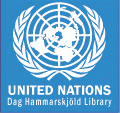|
|
||
|
SECTIONS |
||
|
|
||
|
|
||
|
TAGS
|
||
|
|
||
|
|
||
|
|
||
|
|
||
|
|
||
|
|
||
| |
|
| |
|
| |
|
| | |
|
The objective of these guidelines is to provide staff of UN libraries engaged in subject analysis with a comprehensive set of principles to ensure a consistent approach in indexing various types of UN documents and publications. While many of the principles may apply to cataloguing and indexing non-UN materials, the guidelines focus on indexing the Organization's documentation in its various forms.
Important functions of indexing are to:
To fulfill those functions, both subject analysis and bibliographic description are integral parts of the indexing process, providing metadata that can be used in searches or displayed in formatted records. Subject analysis is the part of the indexing process that deals with
Maintained
by the Department of Public Information (DPI), Dag Hammarskjöld
Library. Comments as well as suggestions for further
additions/enhancements may be directed to the Dag Hammarskjöld Library.
Last updated: 9 June 2009 |
|
